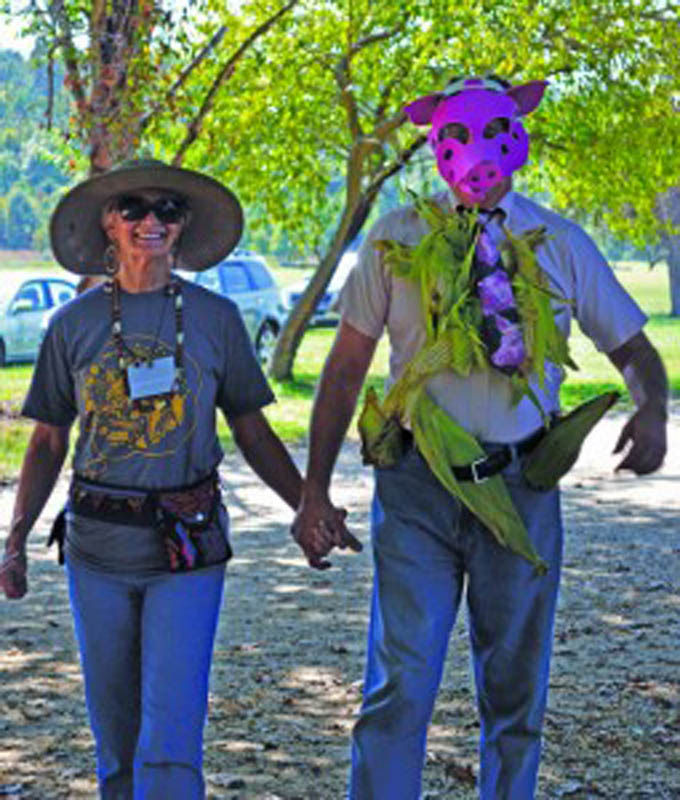Inaugural Festival Provides Food for Thought
- Accokeek Foundation

- Oct 26, 2014
- 2 min read

Board member, Amanda Truett with “King Corn” costume winner, Frank Pipitone.
Whether it was crunching on cricket bars, running a food miles race or learning how to cook healthy on a budget, the inaugural Food for Thought festival offered something for everyone to consider the sustainability of our food system. Held September 20th on the National Colonial Farm, the festival was designed around an essential question of whether we should return to a locally sourced food system like our ancestors had. Over 250 people participated in the event, which featured a panel discussion with leaders in the field of food sustainability, two theater performances on food and farming, cooking demonstrations, food tastings, vendors, games and children’s activities.
Preparations for the event began in February, when Andrea Jones, Director of Programs and Visitor Engagement, conceived the idea for a humanities-focused food event as a way to explore agriculture through a past-to-present lens. Mixing colonial and contemporary activities, the festival encouraged participants to understand the cultural roots of our current agricultural system. As Jones explained, “This festival provides an opportunity for the community to reflect on how we got to the point where we don’t know where our food comes from, and what we can do to change course to a more sustainable model.”
The heart of the festival was a lively panel discussion. James McWilliams, author of Just Food: Where Locavores Get It Wrong And How We Can Truly Eat Responsibly, posited that eating local is not enough, that society must use additional metrics to gauge the sustainability of the food we grow and eat. Joining him in conversation was culinary educator JuJu Harris (author of The Arcadia Mobile Market Cookbook), farmer Forrest Pritchard (author of Gaining Ground, A Story of Farmers’ Markets, Local Food and Saving the Family Farm), and Slow Food DC co-chair Sarah McKinley. Bringing a range of experience and expertise to the conversation, the panelists left the audience with plenty of food for thought.

Food for Thought panelists included authors Forrest Pritchard, JuJu Harris, James McWilliams, and Slow Food DC co-chair, Sarah McKinley.
The Foundation’s Ecosystem Farm manager, Holli Elliott, encouraged people to think outside of the (lunch)box when it comes to sustainable eating by offering samples of unusual foods. People eagerly snacked on weed salad made from the often maligned or overlooked plants commonly found in our backyards, and voted on their favorite flavor of protein bar made with cricket powder. Two companies, Chapul and EXO, kindly donated samples of their cricket bars as a way to promote insects as a more sustainable protein source than livestock.

Farmer Holli and volunteers serve up heirloom tomatoes during Food for Thought festival.
Food for Thought was made possible through a generous grant from the Maryland Humanities Council, and additional support from MOM’s Organic Market and Graham Holdings Company. The event was featured on the MHC Humanities Connection radio program, the Marc Steiner Show, and in several regional newspapers. It brought many first-time visitors to the park, introducing a new audience to the role of the Accokeek Foundation in promoting the natural and cultural heritage of Piscataway Park and our commitment to stewardship and sustainability.
–written by Heather Leach, Agriculture Education Manager







